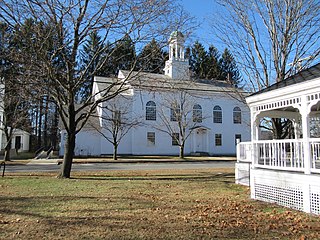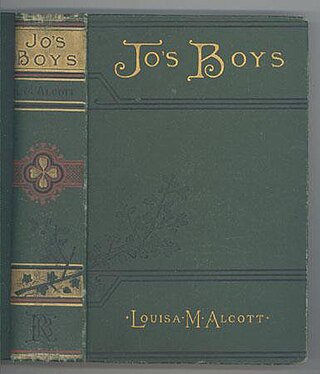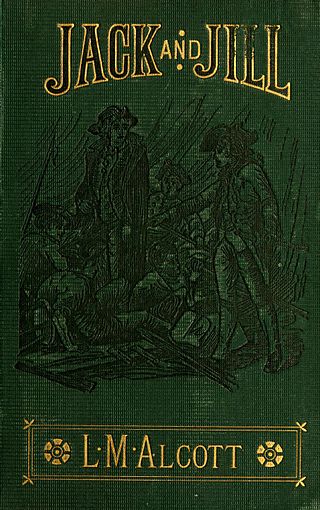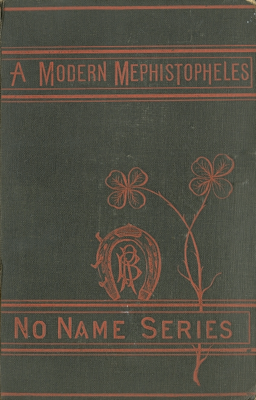
Louisa May Alcott was an American novelist, short story writer, and poet best known for writing the novel Little Women (1868) and its sequels Good Wives (1869), Little Men (1871), and Jo's Boys (1886). Raised in New England by her transcendentalist parents, Abigail May and Amos Bronson Alcott, she grew up among many well-known intellectuals of the day, including Margaret Fuller, Ralph Waldo Emerson, Nathaniel Hawthorne, and Henry David Thoreau. Encouraged by her family, Louisa began writing from an early age.

Little Women is a coming-of-age novel written by American novelist Louisa May Alcott, originally published in two volumes, in 1868 and 1869. The story follows the lives of the four March sisters—Meg, Jo, Beth, and Amy—and details their passage from childhood to womanhood. Loosely based on the lives of the author and her three sisters, it is classified as an autobiographical or semi-autobiographical novel.

Walpole is a town in Cheshire County, New Hampshire, United States. The population was 3,633 at the 2020 census.

Abigail May Alcott Nieriker was an American artist and the youngest sister of Louisa May Alcott. She was the basis for the character Amy in her sister's semi-autobiographical novel Little Women (1868). She was named after her mother, Abigail May, and first called Abba, then Abby, and finally May, which she asked to be called in November 1863 when in her twenties.

Little Men: Life at Plumfield with Jo's Boys, is a children's novel by American author Louisa May Alcott (1832–1888), which was first published in 1871 by Roberts Brothers. The book reprises characters from her 1868–69 two-volume novel Little Women, and acts as a sequel in the unofficial Little Women trilogy. The trilogy ends with Alcott's 1886 novel Jo's Boys, and How They Turned Out: A Sequel to "Little Men". Alcott's story recounts the life of Jo Bhaer and her husband as they run a school and educate the various children at Plumfield. The teaching methods used at Plumfield reflect transcendentalist ideals followed by Alcott's father, Bronson Alcott. Book education is combined with learning about morals and nature as the children learn through experience. Paradoxes in the story serve to emphasize Alcott's views on social norms.

Mary Louisa Molesworth, néeStewart was an English writer of children's stories who wrote for children under the name of Mrs Molesworth. Her first novels, for adult readers, Lover and Husband (1869) to Cicely (1874), appeared under the pseudonym of Ennis Graham. Her name occasionally appears in print as M. L. S. Molesworth.

St. Nicholas Magazine was a popular monthly American children's magazine, founded by Scribner's in 1873 and named after the Christian saint. The first editor was Mary Mapes Dodge, who continued her association with the magazine until her death in 1905. Dodge published work by the country's leading writers, including Louisa May Alcott, Frances Hodgson Burnett, Mark Twain, Laura E. Richards and Joel Chandler Harris. Many famous writers were first published in St. Nicholas League, a department that offered awards and cash prizes to the best work submitted by its juvenile readers. Edna St. Vincent Millay, F. Scott Fitzgerald, E. B. White, and Stephen Vincent Benét were all St. Nicholas League winners.

Mary Elizabeth Mapes Dodge was an American children's author and editor, best known for her novel Hans Brinker. She was the recognized leader in juvenile literature for almost a third of the nineteenth century.

A sister is a woman or a girl who shares parents or a parent with another individual; a female sibling. The male counterpart is a brother. Although the term typically refers to a familial relationship, it is sometimes used endearingly to refer to non-familial relationships. A full sister is a first-degree relative.

Jessie Willcox Smith was an American illustrator during the Golden Age of American illustration. She was considered "one of the greatest pure illustrators". A contributor to books and magazines during the late 19th and early 20th centuries, Smith illustrated stories and articles for clients such as Century, Collier's, Leslie's Weekly, Harper's, McClure's, Scribners, and the Ladies' Home Journal. She had an ongoing relationship with Good Housekeeping, which included a long-running Mother Goose series of illustrations and also the creation of all of the Good Housekeeping covers from December 1917 to 1933. Among the more than 60 books that Smith illustrated were Louisa May Alcott's Little Women and An Old-Fashioned Girl, Henry Wadsworth Longfellow's Evangeline, and Robert Louis Stevenson's A Child's Garden of Verses.

Eight Cousins, or The Aunt-Hill was published in 1875 by American novelist Louisa May Alcott. It was originally published as a serial in St. Nicholas and is part of the Little Women Series. It is the story of Rose Campbell, who has been recently orphaned and resides with her maiden great aunts, the matriarchs of her wealthy family near Boston, until her guardian, Uncle Alec, returns from abroad to take over her care. Through his unorthodox theories about child-rearing, she becomes happier and healthier while finding her place in her family of seven boy cousins and numerous aunts and uncles. She also makes friends with Phebe, her aunts' young housemaid. Eight Cousins received both favorable and unfavorable reviews in the early days of its publication. Reviews focused on Alcott's stylistic tone as well as the portrayal of characters and realism. In Eight Cousins, Alcott discusses transcendental education, child-rearing, and social differences.

Jo's Boys, and How They Turned Out: A Sequel to "Little Men" is a novel by American author Louisa May Alcott, first published in 1886. The novel is the final book in the unofficial Little Women series. In it, the March sisters' children and the original students of Plumfield, now grown, are caught up in real world troubles as they work towards careers and pursue love.

A Long Fatal Love Chase is a 1866 novel by Louisa May Alcott published posthumously in 1995. Two years before the publication of Little Women, Alcott uncharacteristically experimented with the style of the thriller and submitted the result, A Long Fatal Love Chase, to her publisher. The manuscript was rejected, and it remained unpublished before being bought, restored and published to acclaim in 1995.

Ednah Dow Littlehale Cheney was an American writer, reformer, and philanthropist.

Rose in Bloom is a novel by Louisa May Alcott published in 1876 and is a sequel to Eight Cousins. It depicts the story of a nineteenth-century girl, Rose Campbell, finding her way in society, seeking a profession in philanthropy, and finding a marriage partner. Considered enjoyable by some readers and dull by others, the novel received generally positive reviews. Its themes include philanthropy, independence in women, the impact of society, and class differences.

Jack and Jill: A Village Story by Louisa May Alcott is a children's book originally serialized in St. Nicholas magazine December 1879–October 1880 and belongs to the Little Women Series. Parts of it were written during the death of May Nieriker. The novel takes place in the fictionalized New England town of Harmony Village. Jack and Jill is the story of two friends named Jack and Janey and tells of the aftermath of a serious sledding accident. After publication, the novel received reviews comparing it to Little Women and praising its portrayal of reality, while other reviews criticized its romance. Later, parts of the book were adapted into a Christmas play. Authors and professors analyzing Jack and Jill emphasize Alcott's portrayals of gender, disability, and education.
Clara Miller Burd was an American stained glass designer and children's book and magazine cover illustrator.

Gertrude Alice Kay was an American children's literature illustrator and author best known for her work in fairy tales and beginner novels. She was active during America's Golden Age of Illustration.
Harriet Roosevelt Richards was an American illustrator, best known for her work in children's books and magazines.

A Modern Mephistopheles is a gothic thriller published by the Roberts Brothers in 1877 and written by Louisa May Alcott. It is based on Goethe's Faust and contains stylistic elements Alcott used earlier in her writing career. The novel follows Felix Canaris and Gladys, two young people whose lives are manipulated by a wealthy semi-invalid Jasper Helwyze, who seeks to undermine their relationship for psychological experimentation. Under Helwyze's direction, Canaris and Gladys marry. Gladys and Canaris eventually overcome Helwyze's influence on them.



















